Equine Therapy: 7+ Powerful Ways You’ll Unlock Healing Through Horse-Assisted Therapy


Equine therapy is an experiential treatment and healing approach centered around the connection between humans and horses.
It is beneficial for many different individuals with physical or mental health conditions. Participants groom, feed, lead, and ride horses under the supervision of a experiential therapy or mental health professional to form a strong bond.
Horses have been close companions with humans for years, building a distinct connection with those close to them. For centuries, horses (along with other animal-assisted therapies) have helped in physical and mental health treatment for many different groups of people.
Equine therapy is done with the guidance of an equine therapist through different activities with a horse.
There are different forms of equine therapy; some involve riding, saddling, caring for the horse, or simply spending time with the horse and the therapist.
Horses have a sensitivity to human feelings, so when a person communicates to them through nonverbal cues during a therapy session, they can provide them with feedback that promotes a sense of acceptance and comfort, along with aiding in emotion regulation and insight into themselves and others.
Equestrian therapy is considered an evidence-based treatment approach for physical and psychological conditions.
Equine therapy can be a very effective treatment option for individuals with mental health conditions such as depression, anxiety, trauma, ADHD, autism, eating disorders, and others.
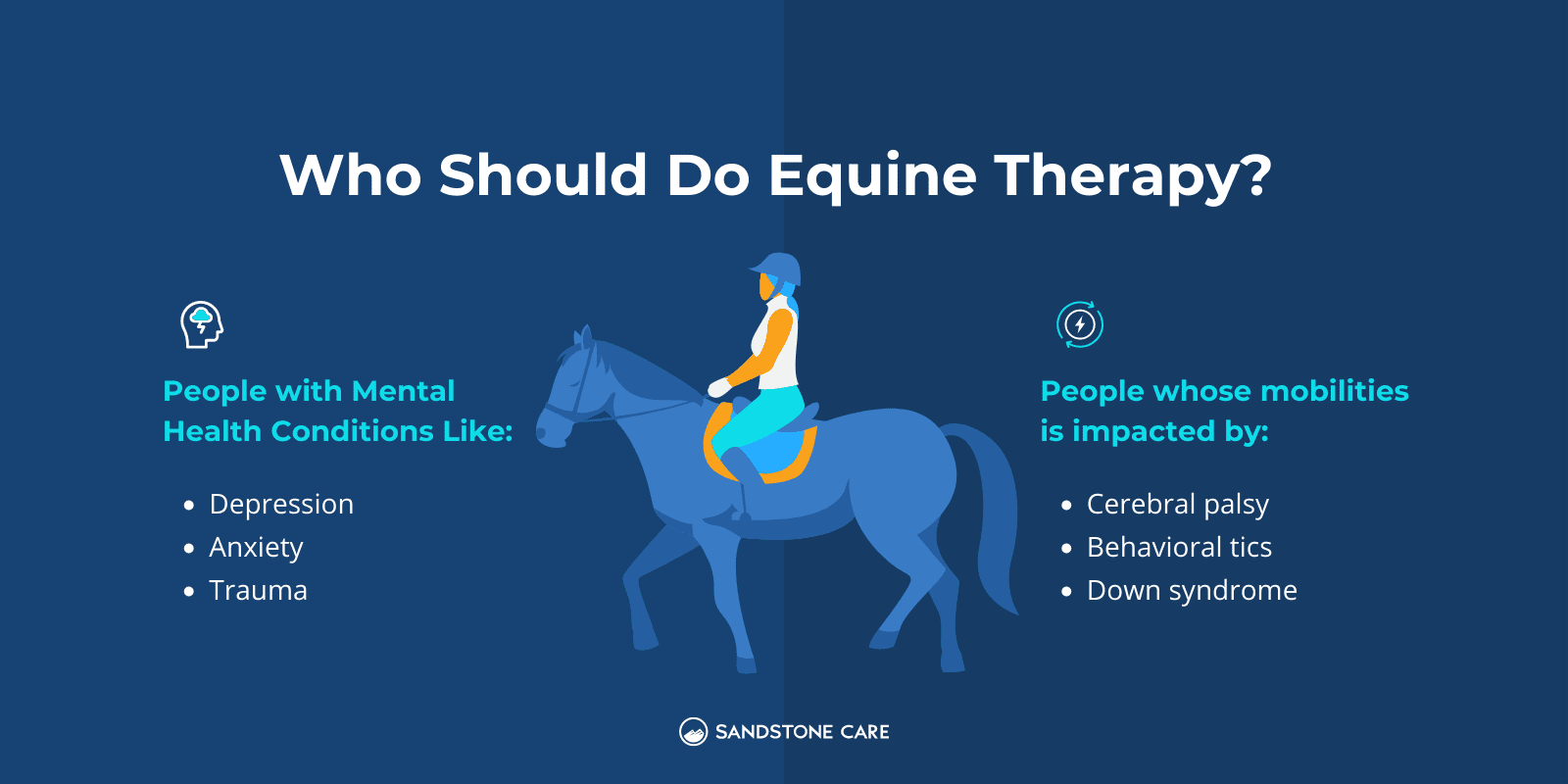
The goals of equine therapy depend on the unique individual.
Common goals of equine therapy are to help an individual find relief from stress, manage symptoms of depression and anxiety, improve communication skills, build trust, secure wellness, or learn how to regulate their emotions.
Horses that are chosen for equine therapy are usually chosen with the consideration that they can tolerate distraction and unpredictable behavior well.
They have a calm temperament, are used to attention, and have a low flight risk. The horse’s behaviors show that they are usually relaxed and ready to work with people.
Depending on the type of equine being done, a horse may be chosen partly for its gait, which refers to the different types of movements a horse makes to get around.
The name “hippotherapy” is used as a similar term to equine therapy, which refers to treatment that involves the help of a horse.
It is important to recognize that there are many different forms of equine therapy, and each one has different goals and methods.
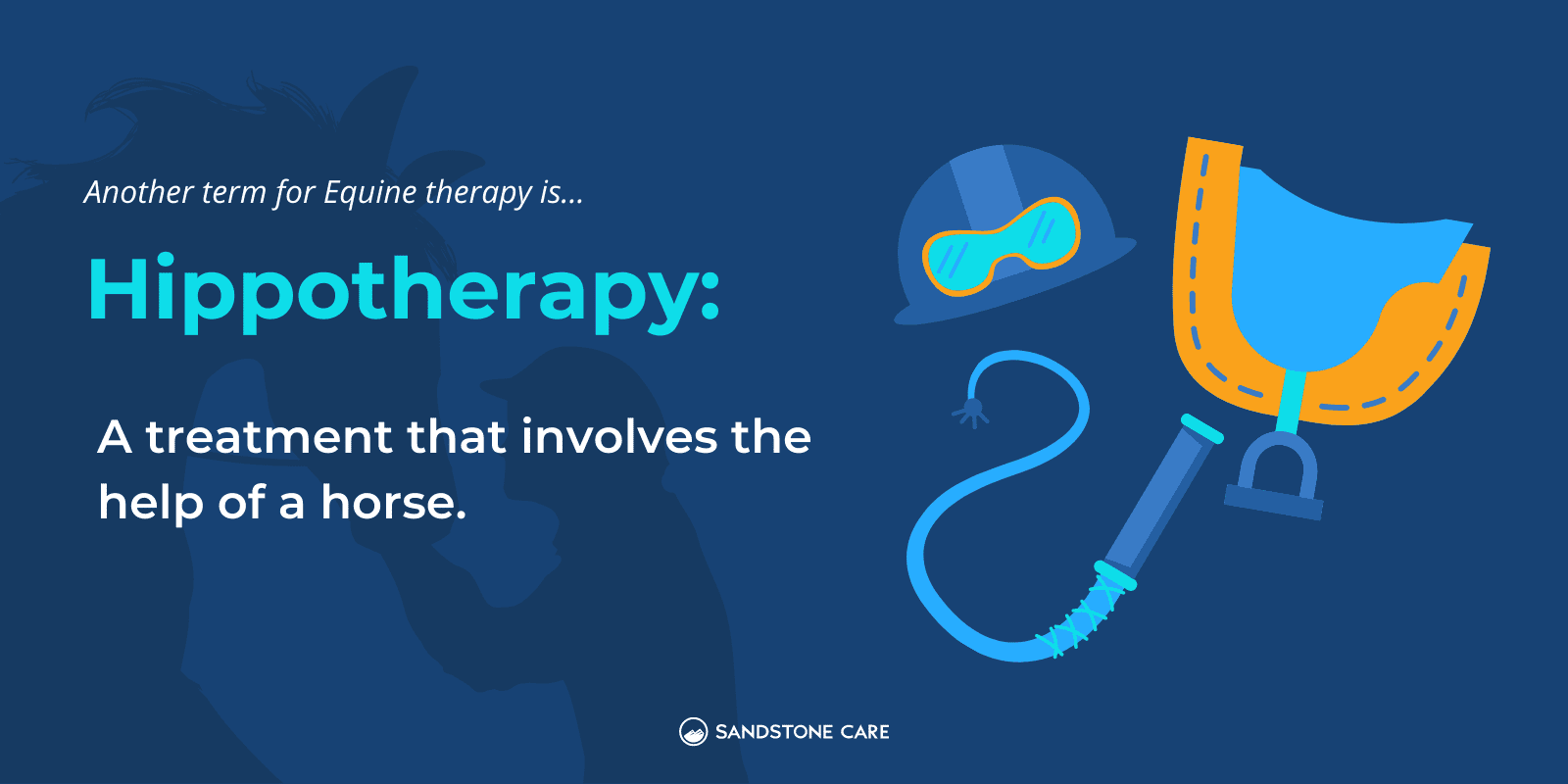
Cognitive benefits associated with equine therapy can include:
The bond the individual builds with the horse in equine therapy can help improve their social skills in many ways.
For one, as the individual interacts and cares for the horse, they learn to trust and create boundaries. This can also relate to judgment and self-control skills.
These skills can impact the way they learn to communicate, which can carry over into the relationships they have with others.
There is another level of nonverbal communication between a horse and the person that can help them learn more about themselves and the way they communicate with others.
When considering different therapy approaches for you or a loved one, it is important to weigh the pros and cons.
While equine therapy holds many benefits, it can cost more time, money, and resources than other forms of treatment.
Therapy is also different for each individual. For some, it may not be the best fit.
When used to help children, the bond that the child builds with the horse may become so strong that when it comes time to end treatment or part with the horse, it can cause negative effects on their mood and behaviors.
Although having difficult feelings when parting with a horse that you bonded with is natural, the individual, whether young or older, can use the skills they learned through equine therapy and apply them to this transition.
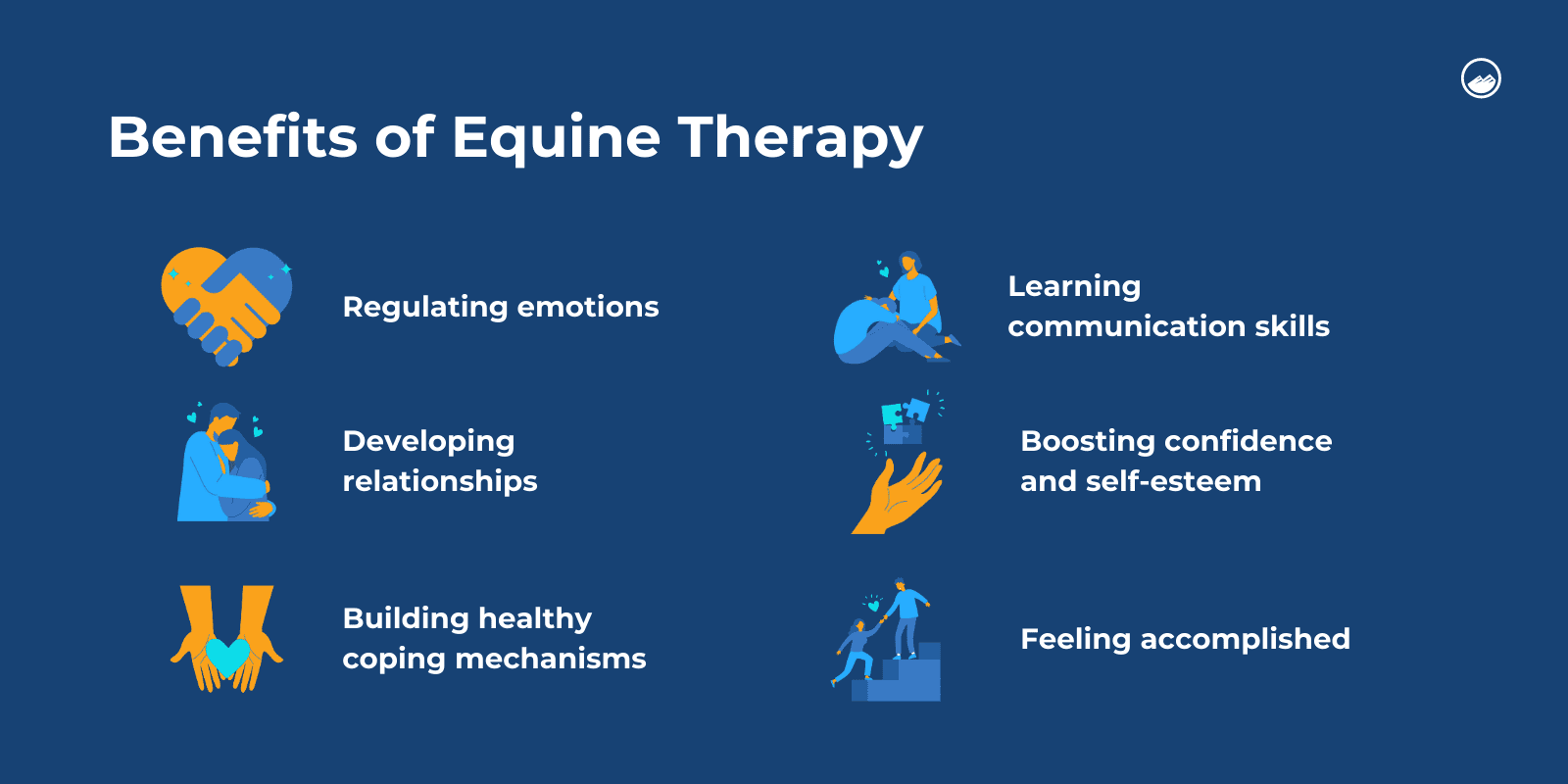
Equine therapy has been shown to be a promising treatment option.
Although, it is important to note that equine therapy is different for everyone, and what works for some people may not work for others.
It is important to do research and discuss with your healthcare provider, treatment center, a mental health professional, or your support network to help you decide if equine therapy is the best fit for you.
The relationship between humans and horses is quite unique.
A horse’s sensitivity to human emotions gives them this distinct ability to connect on a different level and provide immediate feedback to an individual, creating a strong bond between the two.
This bond can help promote trust, communication, emotion regulation, and much more, making it an effective treatment option for individuals with mental health disorders, substance use disorders, or physical health conditions.
Horses and other animals have been used to aid in medical treatments for centuries.
It is believed that the physical, emotional, and psychosocial qualities of horses help establish their role as therapy aids and companions.
Different types of equine therapies work in different ways.
For example, horse riding can come with physical benefits such as decreasing muscle tightening and stiffness through the horse’s body temperature. The movement of horses can also improve motor function and core strength.
The psychosocial effects of equine-assisted therapy come from the horse’s ability to recognize human emotions and provide an intentional response.
These effects can improve self-esteem, self-presence, independence, and feelings of freedom.
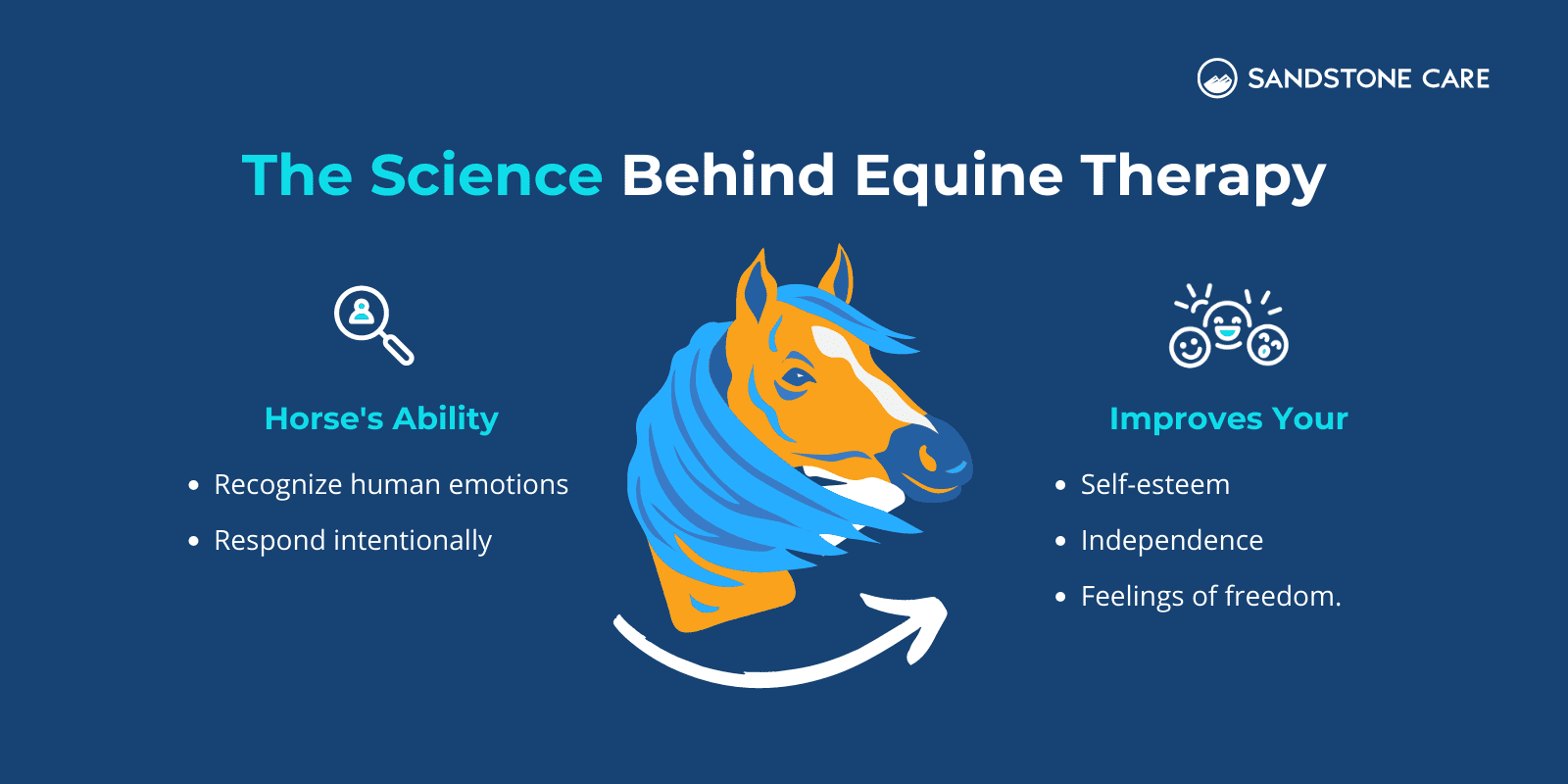
There are different types of equine therapies, which can include:
Therapeutic horseback riding is most commonly used for individuals with disabilities but can also be helpful for others.
Equine movement in hippotherapy motor learning and many skills of daily life.
Equine-assisted psychotherapy integrates traditional talk-therapy methods with different strategies of communication and coping that can be learned from a horse.
Equine-assisted services are commonly grouped into three broad categories which include:
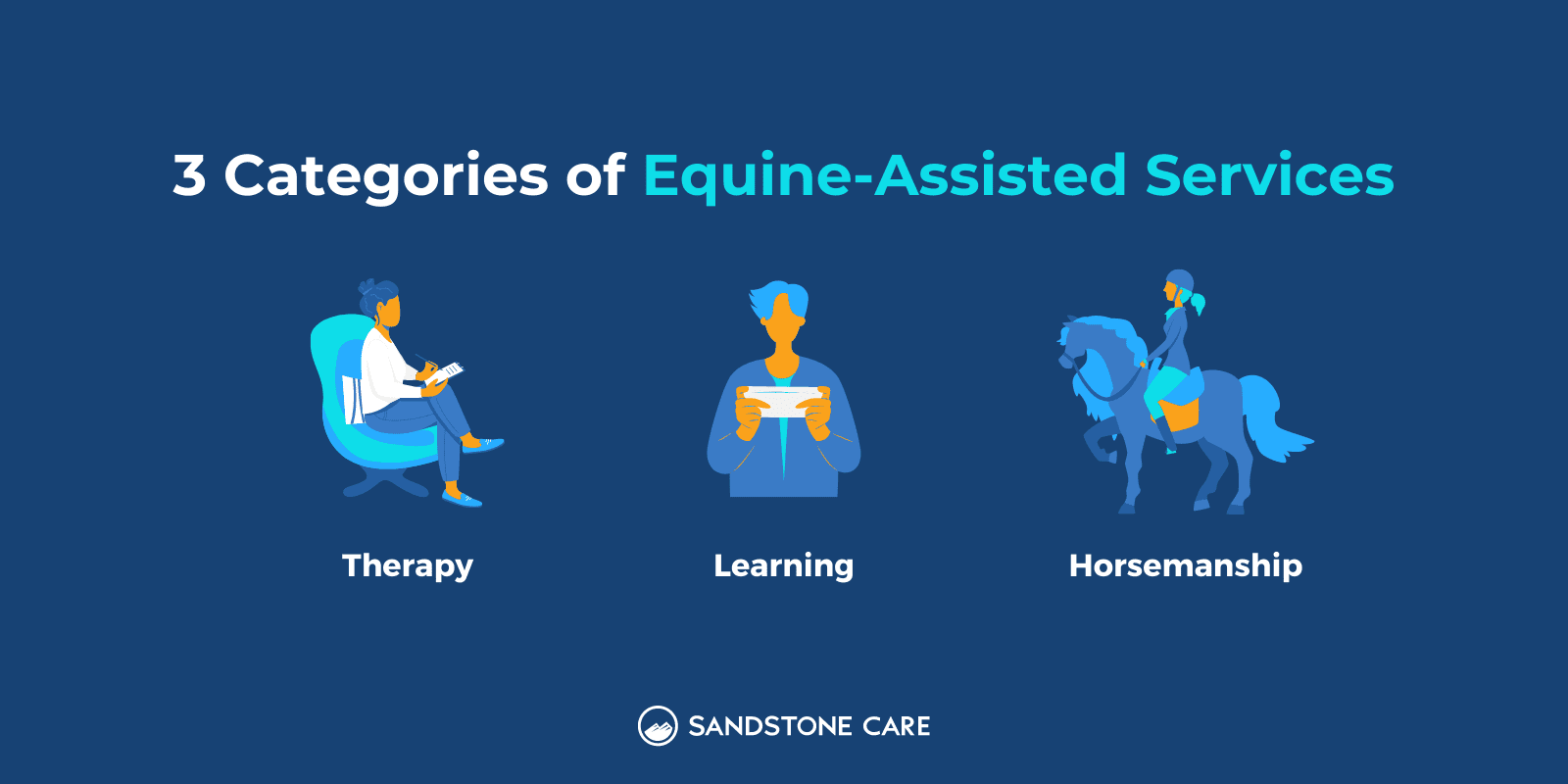
Research looks at the connection that humans have with horses and their ability to pick up on people’s emotions.
In a 2019 study, it was tested whether horses can recognize and respond to human emotions both visually and non-verbally. Results showed that horses could recognize human emotions and react emotionally to the emotional state of humans.
Eye Movement Desensitization Reprocessing (EMDR) therapy is a mental health treatment technique that is done by moving your eyes in a specific way while you process difficult or traumatic memories.
With EMDR equine therapy, therapists integrate EMDR therapy with equine-assisted interactions to help support the individual.
Equine therapy can be helpful for individuals with depression in coping with difficult emotions, improving their mood, managing symptoms of depression, and building trust and connection.
Additionally, spending time outside has been associated with improved mood and overall well-being. Many other treatments don’t provide the same outdoor environment that equine therapy does.
Equine therapy can help individuals with anxiety in impulse control, self-reflection, building confidence, building trust, and reducing stress.
Individuals with anxiety experience worries that feel uncontrollable and affect their daily life and well-being.
It can be very difficult to interrupt these worrying thoughts, but equine therapy can provide support, healing, and a positive environment where individuals can let go of these worries and learn to cope and be in the moment.
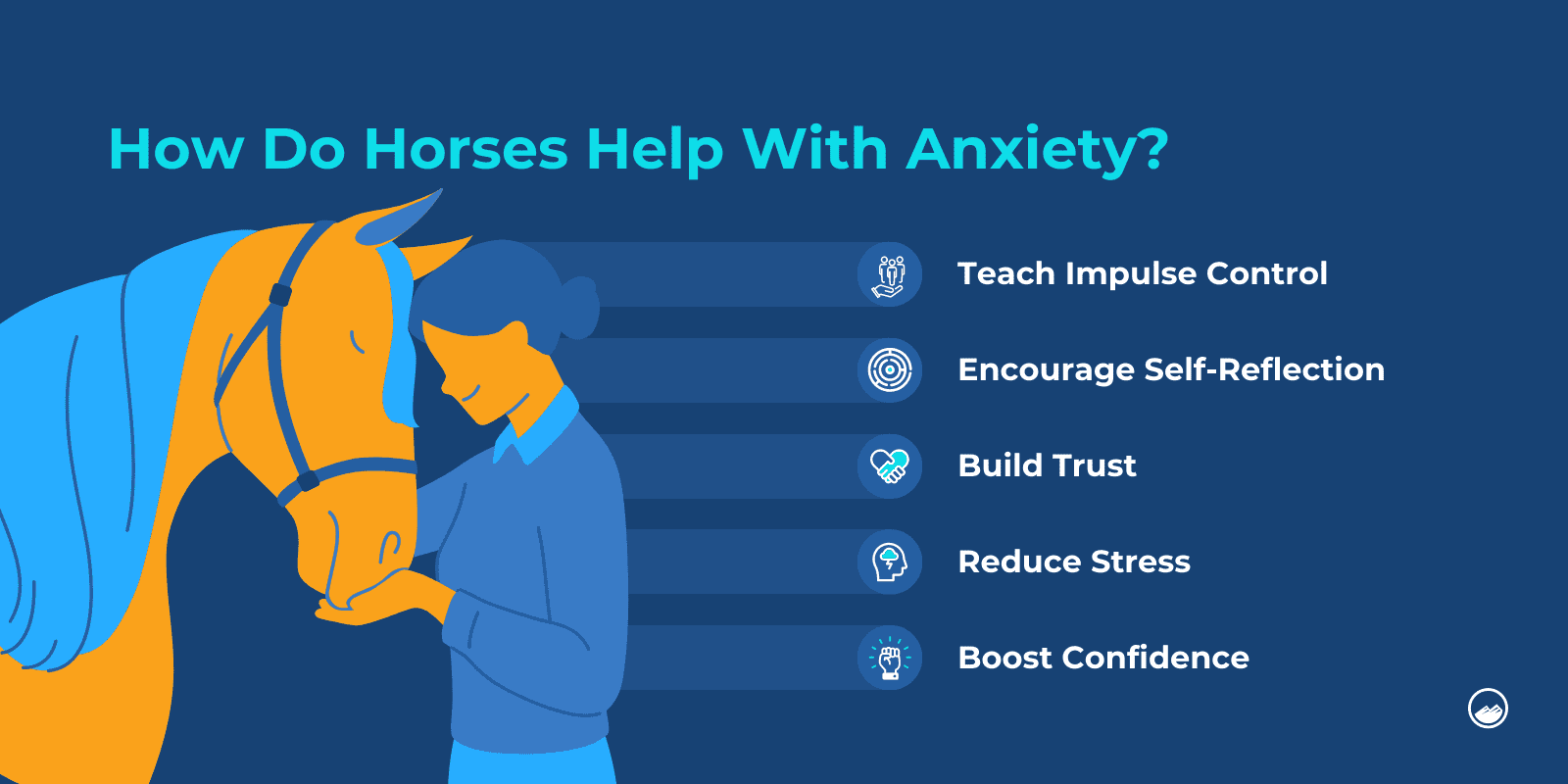
With equine therapy, it is believed that the horse can sense a person’s feelings along with anxiety and stress.
Because of this, they have the ability to help individuals identify these feelings in themselves and learn to cope with them and help them find relief.
Equine therapy has been used in addiction treatment and recovery.
Horse therapy provides a safe environment where individuals in recovery can go to find calmness, gain insight into themselves, their lives, and others, and build new skills that they can apply in “real life.”
Through equine therapy, an individual in addiction recovery can:
Because of horses’ sensitivity to human emotion, there are questions surrounding whether or not horses can sense Post-Traumatic Stress Disorder (PTSD).
Horses have the ability to recognize emotions and provide feedback when they are experiencing stressful or difficult thoughts.
This ability has made equine therapy a positive treatment option for individuals facing challenges with PTSD.
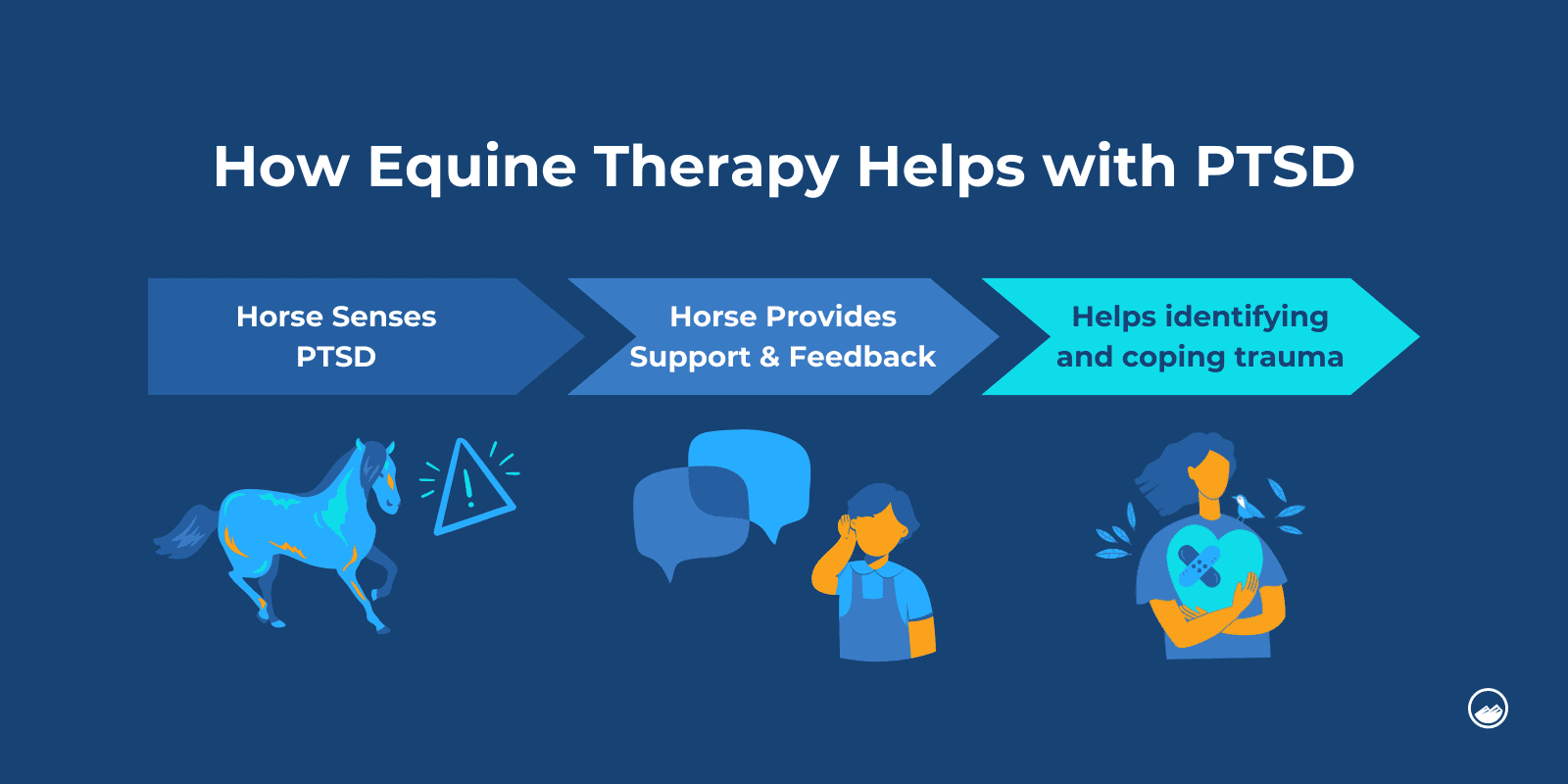
Equine therapy has been used as a therapeutic approach for individuals with PTSD.
Because of the emotional sensitivity of horses to humans, they can provide support and feedback to people who can help an individual identify and cope with difficult feelings and triggers that come with trauma.
Compared to traditional psychotherapies, equine therapy offers a unique setting where individuals can receive help while at the same time forming a secure bond with horses and spending time in a calming and positive environment.
Many forms of therapy take place in indoor treatment centers or facilities that don’t provide the same support and comforting environment that equine therapy does.
Additionally, equine therapy differs from traditional talk therapy in the way that it integrates different ways of processing emotion and communicating. Different types of therapy can help people with different needs, and equine therapy provides a unique avenue for finding wellness.
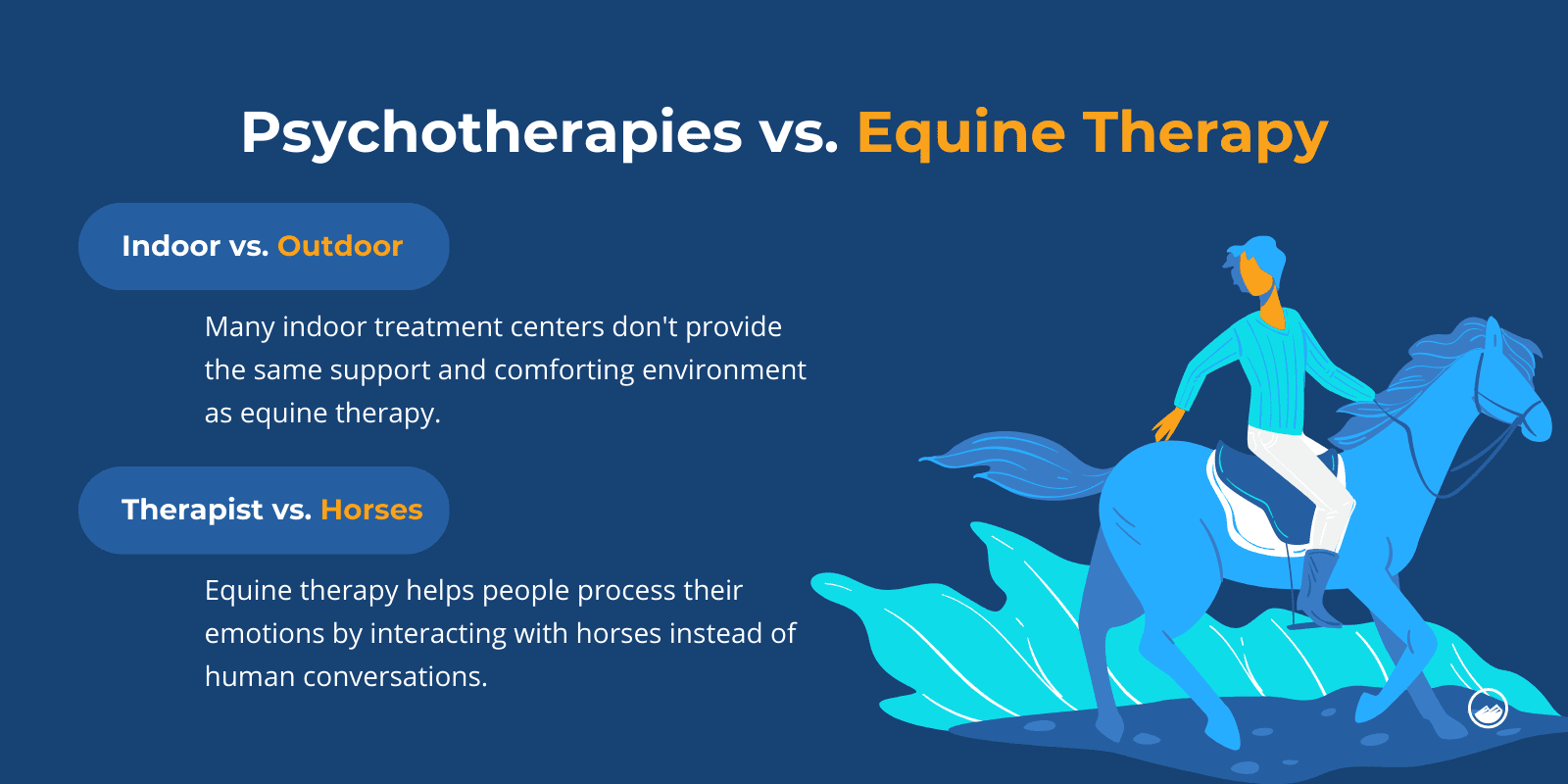
Equine therapy for teens can help young people build important skills that they can apply in their everyday lives while also providing them with security, support, and comfort.
Equine-assisted therapy can be beneficial for a young person’s mental, physical, and emotional health. It can help them understand and identify their emotions and ways to cope, and it can help them manage symptoms of physical conditions and mental health disorders.
At-risk youth can also benefit from equine-assisted therapy by learning independence, responsibility, and communication.
Sandstone Care offers an equine therapy program at the Colorado teen rehab center, where young people can find help and support through experiential therapy.
For teens, it can be hard to find a treatment approach that is effective in addressing all their concerns while, at the same time, considering their stage of development and emotional needs.
Equine therapy provides a setting where young people can feel comfortable and understood without judgment. The connection and bond they build with the horse can provide them with the support they need to find healing and guidance.
Sandstone Care offers a variety of different substance use and mental health disorder treatments for teens, young adults, and adults.
We provide age-specific, individualized treatment that caters to each individual’s unique needs.
Equine therapy is a unique treatment approach that is not offered in the majority of mental health and substance abuse treatment centers, and it is a beneficial treatment option to consider when looking at different centers.
At Sandstone Care, we provide compassionate care specific to each stage of life.
FAQ
Our goal is to provide the most helpful information. Please reach out to us if you have any additional questions. We are here to help in any way we can.
It depends on your insurance coverage, but equine therapy can be covered by insurance.
If you are interested in equine therapy, reach out to the treatment center and to your insurance provider to help you learn more about your options.
At Sandstone Care, you can get instant insurance verification by contacting us today.
Therapeutic riding is a recreational activity that teaches horse riding skills to individuals with disabilities.
The benefits of therapeutic riding can help with an individual’s cognitive, physical, emotional, and social well-being.
Equine therapy shares similar benefits but is a broad term that refers to a variety of different treatment methods that involve the connection between people and horses.
Unlike therapeutic riding, equine therapy doesn’t always involve riding on a horse. It can include caring, grooming, or simply just spending time with a horse and therapist.
Horses have unique bonds with humans that have been present for decades.
They are considered to be companion animals and form attachments to herd mates and humans.
Horses are also considered to be very emotional and social animals and also have long memories that allow them to remember their human companions even after they have parted ways.
American quarter horses are most commonly used in equine therapy.
These types of horses tend to be calm and friendly, which makes them great fits for assisting in therapy.
But, many different horses have been used for equine therapy.
The choice depends on the individual horse, its temperament, size, trot, and response. Many horses can make great fits for therapy, and it is not limited to just one breed.